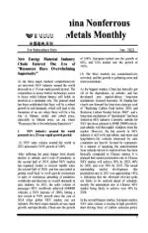The State Will Fully Support Leading Secondary Metal Enterprises and Raise the Industrial Access Threshold
2014-08-15
Gao Dongsheng, Vice Director of the Department of Energy Conservation and Comprehensive Utilization under the Ministry of Industry and Information Technology(MIIT), said on Jan, the Ministry will make efforts to raise the technical standards and access threshold of the renewable resources recycling and utilization industry, and give full support to leading enterprises in the industry so as to address problems of our country’s renewable resources industry, including small enterprise size, low technical level and poor utilization efficiency of energy resources, and to facilitate to the maximum extent energy conservation, emission reduction and effective and high-value utilization of resources.
At the first annual summit of China’s renewable resources industry organized by China Renewable Resources Recycling and Utilization Association, Gao Dongsheng noted that through raising the access threshold and supporting leading enterprises, economic benefits can be improved and industrial selfregulation can be enhanced, and moreover, the industrial energy conservation and environmental protection level can also be improved.
According to the experts participating in the summit, with the start of the scraping peak of home electronic products and motor vehicles like automobiles, theoretically over 5,000 units will be scrapped each year. Effective and safe disposal, recycling and utilization of various wastes can increase resources supply, save energy, protect the environment and alleviate the pressure on resources and environment. However, compared with developed countries in America and Europe, our country’s recycling and re-utilization of waste electronic products is still of low level. In our country, there are a few thousand enterprises each engaged in the recycling and utilization of waste plumbic acid batteries and aviation wastes respectively, while in developed countries there are only several or a dozen large enterprises in the industry. Small enterprises are limited by small size and low technical capability, consequently the resource utilization efficiency is low, and it is easy to cause secondary pollution. It is necessary for the state to take actions to drive standardization and healthy development of the industry.
In this regard, Deputy Secretary-General of the NDRC Zhao Jiarong said that recycling and utilization of renewable resources is an important part of our country’s resources strategy, as well as a part of the emerging strategic industry and a critical approach to alleviate constraints in resources and environment. The development of recycling and utilization of renewable resources must be guided by technology, driven by innovation and requires the collaboration of enterprises, institutions of higher education and research institutes. Currently, some enterprises are faced with the problems of constantly increasing labor cost and land price, and relatively heavy tax burden.
Information from the National Development and Reform Commission shows that in 2012, total recycling volume of the eight categories of major renewable resources including iron and steel scrap and nonferrous waste was about 160 million tons; compared with production of these metals directly using ore, 170 million tons of standard coal was saved, and the discharge of 11.27 billion tons of waste water, 37.46 billion tons of sulfur dioxide and 3.39 billion tons of solid waste was avoided. Of the recycled metal, there was about 2.75 million tons of secondary copper, accounting for 45% of our country’s copper output. According to experts from Tsinghua University, 250 grams of gold can be extracted from one ton of scrapped computer motherboards, while one ton of gold ore can only produce several grams of gold.
Li Lei, Vice Director of Pollution Prevention and Control Department under the Ministry of Environmental Protection, said that by learning from the advanced international experience of adopting manufacture responsibility extension system in disposing of waste appliance and electronic products, our country officially began to collect waste appliance and electronic product disposal fund in 2012. Not long ago, the Ministry of Environmental Protection and the Ministry of Finance appropriated RMB629 million from the fund as subsidies to 39 electronic waste disassembly enterprises.
杂志排行
China Nonferrous Metals Monthly的其它文章
- State Grid Plans to Invest RMB403.5 Billion in 2014, Benefiting Non-ferrous Materials
- It is Imperative for Chinese Enterprises to Change their Investment Model in Overseas Mining Industry
- Tibet’s Duolong Is Expected to Become a World-class Copper-Gold Mining Base
- The Ministry of Land and Resources Published the “Three-Rate” Indicator for Seven Minerals Including Iron Ore and Copper
- The Country’s New Policy Represents a Major Challenge for Lead Enterprises in Henan
- Chifeng to Build RMB200 Billion Nonferrous Metals Club
